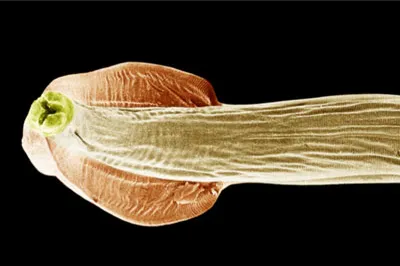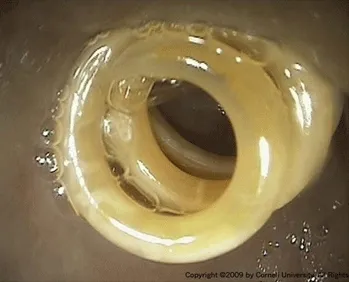Bringing a dog into your home enriches your life in countless ways, but it also comes with the responsibility of ensuring their health and, by extension, your family’s safety. One common concern for pet owners is parasitic infections, and roundworms are among the most prevalent intestinal parasites found in dogs. A natural question that arises for many dog parents is: Can I Get Roundworm From My Dog? The answer is yes, humans can indeed contract roundworms from dogs, making it crucial to understand how this happens and, more importantly, how to prevent it. This article delves into the nature of canine roundworms, their impact on dogs, the potential risks to human health, and essential preventive measures to keep both your furry friend and your family safe.
What Are Roundworms and How Do Dogs Get Them?
Roundworms, primarily Toxocara canis and Toxascaris leonina, are common parasitic worms that live in the intestines of infected dogs. Nearly all dogs will become infected with roundworms at some point in their lives, most frequently as puppies. These tenacious parasites have several pathways for transmission, making them widespread and a constant concern for dog owners.
Dogs can acquire roundworms in various ways:
- Maternal Transmission: This is a very common route, especially for puppies. An infected mother dog can pass roundworm larvae to her offspring while they are still in her uterus (in utero) or through her milk during nursing. This means puppies can be born with roundworms or acquire them very early in life.
- Environmental Ingestion: Dogs can become infected by ingesting microscopic roundworm eggs that have embryonated in the environment. These eggs are shed in the feces of infected animals and can survive in soil for extended periods. When a dog sniffs, licks, or eats contaminated soil, grass, or even other infected feces, they can ingest these eggs.
- Paratenic Hosts: Roundworm larvae can reside dormant in the tissues of small mammals, such as mice, rats, or other rodents. If a dog hunts and eats one of these infected “paratenic” hosts, the larvae can then develop into adult worms in the dog’s intestines.
Once ingested, the roundworm eggs hatch, and the larvae migrate through the dog’s body, including the liver and lungs, before returning to the intestines to mature into adult worms. This complex lifecycle highlights why prevention and regular deworming are so critical.
Signs of Roundworm Infection in Dogs
Adult roundworms primarily inhabit the small intestines of affected dogs. While many adult dogs with light infections may not show obvious clinical signs, especially puppies and dogs with heavier worm burdens, often display clear symptoms. Recognizing these signs is vital for early intervention.
Common symptoms of roundworm infection in dogs include:
- Diarrhea and Vomiting: Gastrointestinal upset is a frequent sign, sometimes accompanied by the visible presence of worms.
- Weight Loss and Poor Growth: Despite eating normally, infected dogs, particularly puppies, may fail to gain weight or even lose it, leading to a “pot-bellied” appearance due to the worms taking essential nutrients.
- Dull Coat: A healthy, shiny coat can become dull, dry, or even coarse.
- Pot-bellied Appearance: This is particularly noticeable in puppies and indicates a heavy worm burden, causing abdominal distension.
- Coughing: If roundworm larvae migrate through the lungs, they can cause irritation, leading to a cough.
- Visible Worms: You might notice adult roundworms in your dog’s feces or vomit. They typically appear white or light brown, are spaghetti-like in shape, and can range from a few to several inches long.
 Close-up of a canine roundworm (Toxocara canis) showing its distinct anterior features, a common parasitic worm affecting dogs and posing a zoonotic risk to humans.
Close-up of a canine roundworm (Toxocara canis) showing its distinct anterior features, a common parasitic worm affecting dogs and posing a zoonotic risk to humans.
If you observe any of these symptoms, it’s essential to consult your veterinarian promptly for diagnosis and treatment.
Preventing Roundworms in Your Dog
Preventing roundworm infection in your dog is a cornerstone of responsible pet ownership and directly contributes to minimizing the risk of human exposure. Given the numerous ways roundworms can enter your dog’s body, a multi-faceted approach is most effective.
Key preventive measures include:
- Maintain Strict Hygiene: Keep your dog’s living areas clean, including kennels, bedding, and yards. Regularly remove and dispose of dog feces promptly, ideally daily, to prevent eggs from embryonating and becoming infectious.
- Discourage Scavenging: Prevent your dog from eating wild animals, such as mice, rats, or rabbits, which can act as paratenic hosts carrying roundworm larvae.
- Regular Deworming Schedules:
- Puppies: Due to the high risk of maternal transmission, puppies should be dewormed at 2, 4, 6, and 8 weeks of age. Following this initial series, monthly preventive treatments are often recommended.
- Adult Dogs: Adult dogs should receive fecal (stool) examinations 1 or 2 times each year, and a veterinarian will recommend appropriate deworming based on risk factors and test results. Many heartworm preventives also control common intestinal worms, including roundworms, offering a convenient way to manage multiple parasites. Discuss with your vet about the
best flea and worm treatment for dogsor a comprehensivebest worm flea and tick treatment for dogsto find the most suitable option for your pet’s needs. - Nursing Mothers: Keeping nursing mothers on a monthly preventive treatment and deworming them alongside their puppies is crucial to reduce the risk of transmission to the litter.
- Veterinary Consultation: Always consult your veterinarian to establish the most appropriate prevention and treatment plan for your specific dog. They can advise on specific medications, including discussing potential
side effects of hookworm medicine for dogsor options forover the counter hookworm medicine for dogsif appropriate, ensuring the safety and effectiveness of the treatment.
 Illustration or image depicting adult roundworms (ascarids) actively inhabiting a dog's intestine, highlighting the common site of infection.
Illustration or image depicting adult roundworms (ascarids) actively inhabiting a dog's intestine, highlighting the common site of infection.
The Human Risk: Can You Get Roundworms from Your Dog?
To directly answer the primary concern, yes, you can get roundworms from your dog, though it’s important to understand the mechanism. Humans typically contract roundworms through accidental ingestion of microscopic roundworm eggs (Toxocara canis), not directly from contact with an infected dog. This type of human infection is known as Toxocariasis, a zoonotic disease.
The eggs, shed in the feces of an infected dog, can contaminate soil in yards, parks, and playgrounds. These eggs are incredibly hardy and can survive in the environment for months or even years. If a human, especially a child, accidentally ingests these infectious eggs (e.g., by touching contaminated soil and then putting unwashed hands in their mouth, or by eating contaminated produce), they can become infected. This emphasizes the importance of understanding not only how your pet can get roundworms but also how to maintain general household hygiene, similar to how understanding if you can get ear mites from dogs helps prevent other parasitic issues.
Symptoms of Roundworm Infection in Humans
Unlike in dogs where the worms mature in the intestines, in humans, the roundworm larvae do not develop into adult worms. Instead, the larvae migrate through various organs, causing different clinical syndromes collectively known as Toxocariasis. The severity of symptoms depends on the number of ingested eggs, the organs affected, and the individual’s immune response.
The two main forms of human Toxocariasis are:
- Visceral Larval Migrans (VLM): This occurs when larvae migrate through internal organs such as the liver, lungs, heart, or brain. Symptoms can be vague and non-specific, including fever, cough, asthma-like symptoms, abdominal pain, or an enlarged liver. In rare, severe cases, neurological signs can develop if larvae reach the central nervous system.
- Ocular Larval Migrans (OLM): This form involves the migration of larvae to the eye, where they can cause inflammation, vision loss, or even blindness in the affected eye. OLM typically affects only one eye and is more common in older children and young adults.
While these conditions are less common than canine infections, they can be serious, particularly for young children whose immune systems are still developing and who are more likely to engage in behaviors like playing in dirt and not washing hands thoroughly.
Protecting Yourself and Your Family from Canine Roundworms
Protecting yourself and your family from roundworm infection primarily involves good hygiene practices and diligent pet care.
Here are essential steps to take:
- Practice Excellent Hand Hygiene: Always wash hands thoroughly with soap and water after handling pets, gardening, playing outdoors, or before eating.
- Supervise Children: Closely supervise children when they play outdoors, especially in areas where animals may have defecated. Teach them not to put soil or dirt in their mouths and to wash their hands immediately after playing. Consider covering sandboxes when not in use to prevent contamination.
- Prompt Fecal Removal: Ensure all pet waste is removed from your yard, public parks, and playgrounds immediately and disposed of properly. This reduces the concentration of potential infectious eggs in the environment.
- Regular Veterinary Care for Pets: Maintain your dog’s regular deworming schedule as recommended by your veterinarian. This is the most effective way to prevent your dog from shedding infectious eggs into the environment.
- Garden with Gloves: If you garden or work with soil, wear gloves to minimize direct contact with potentially contaminated ground.
- Clean Pet Areas: Regularly clean and disinfect areas where your pet spends time, especially if they have been ill.
Conclusion
Roundworms are a common reality for dog owners, but understanding their lifecycle and transmission routes empowers you to take proactive steps. While the thought of contracting parasites from your beloved pet can be unsettling, adherence to proper hygiene and a consistent deworming regimen for your dog dramatically reduces the risk of human infection. Responsible pet ownership not only ensures the health and well-being of your canine companion but also safeguards the health of your entire family. Always work closely with your veterinarian to tailor the best parasite prevention program for your dog, ensuring a happy, healthy, and safe environment for everyone.
References:
- CAPCVet.org. (n.d.). Ascarid (Roundworm) Guidelines. Retrieved from https://www.capcvet.org/guidelines/ascarid/
